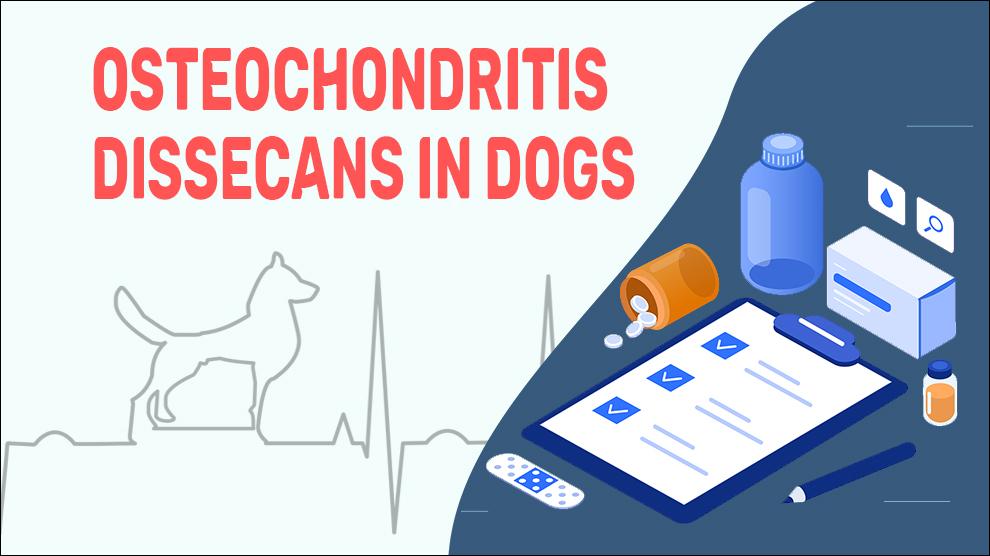Osteochondritis Dissecans (OCD) is an inflammatory, progressive, developmental, orthopedic condition in which diseased joint cartilage separates and failed to develop properly into a bone. OCD typically affects the shoulder and elbow joints, but it can also affect the hocks (ankles), hips, and knees resulting in lameness.
The disorder in the normal cartilage cells differentiation results in failure of endochondral ossification (embryonic cartilaginous model (hyaline cartilage) of most bones replacement with bone). In quickly growing dogs, the faster cartilage development can exceed its own blood supply resulting in irregular cartilage development.
Sometimes, diseased cartilage flaps get estranged from the remaining cartilage surface. This may cause pain, lameness, and even osteoarthritis.
The development of OCD is caused by multiple factors, including genetics, growth rate, trauma, diet, joint architecture, and hormonal imbalance. More commonly, OCD is found in dogs receiving too much calcium and energy in the diet. This developmental disorder occurs in rapidly growing large breed male dogs usually between 6 and 10 months of age.
Symptoms Of Osteochondritis Dissecans
- Limping
- Lameness starts in one limb and progresses to all four.
- Deformed bones
- Rigidity / Stiffness
- Trouble getting up
- Grinding in the joint
- Swelling / Inflammation of joints
- Weight gain
- Exercise intolerance
- Excessive panting
Treatment Options For Osteochondritis Dissecans
For Mild Cases:
Physical therapy, chondroprotective agents, and making sure the affected dogs do not become overweight are enough.
NSAIDs like:
- Carprofen (Rimadyl, Canidryl, Rimifin, Vetprofen).
- Meloxicam (Metacam, Muvera, Mobic).
- Firocoxib (Previcox, Equioxx).
- Deracoxib (Novartis).
- Etodolac (EtoGesic, Lodine).
Pain-relieving medications like amantadine, tramadol, gabapentin, etc may be prescribed by veterinarians.
Joint supplements: Chondroitin / Glucosamine (e.g., Cosequin, Dasuquin, Glycoflex, Vetri-Flex) and essential fatty acid supplements.
In Severe Cases:
Arthroscopy (Fiberoptic scope): Through a small incision, thin flexible fiberoptic scope is inserted into the joint space and clears out pieces of bone and/or cartilage or any loose flaps.
OCD of the shoulder: Polycarbonate urethane grafting and the use of titanium metal.
Home Remedies For Osteochondritis Dissecans
- Home-prepared diets are good for OCD dogs than dry and canned dog foods.
- Ensure your dog is getting enough exercise.
- Weight management for your dog is important.
Prevention Of Osteochondritis Dissecans
OCD etiology is not yet understood completely. Specific causes are not yet identified. However, genetics play an important role in the development of OCD in some breeds and it is better to examine the susceptible dogs before breeding or before acquiring a dog from an unfamiliar lineage. In addition, siblings and previous litter of an affected dog also should not be bred.
Affected Breeds Of Osteochondritis Dissecans
Giant Dog Breeds, Labrador Retriever, Golden Retriever, Newfoundland, Bernese Mountain Dog, Chow Chow, German Shepherd, Mastiff, Old English Sheepdog, Rottweiler, Standard Poodle, Young Large Dogs
Additional Facts For Osteochondritis Dissecans
- Cause:
- Congenital
- Rapid cartilage growth
- Abnormal maturation of cartilage
- Inflammation
- Joint architecture and joint trauma
- Overfeeding
- Hormonal imbalance
- Skeletal dysplasia
- Types:
- OCD of the shoulder:
- Border Collies
- Great Danes
- Irish Wolfhounds
- OCD of the ankle (hock):
- Labrador Retrievers
- Golden Retrievers
- Rottweilers
- OCD of the knee:
- Golden Retrievers
- German Shepherds
- Great Danes
- Labrador Retrievers
- Newfoundlands
- OCD of the spine (particularly lumbosacral joint):
- Boxers
- German Shepherds
- Rottweilers
- OCD of the elbow:
- Golden Retrievers
- Labrador Retrievers
- Mortality:
There is no evidence of OCD alone affecting the life span. OCD may cause arthritis. There are few studies that state that osteoarthritic dogs have a higher mortality rate than dogs without osteoarthritis (both are of the same age).
- Diagnosis:
- Bloodwork to check for hormonal conditions.
- Radiographs to look at the bones and joints.
- Orthopedic exam to check for joint pain or problems.
- Magnetic resonance imaging (MRI).
- Arthrograms
- Prognosis:
OCD is a degenerative disease that gets increasingly worsen over time. Early veterinary intervention (whether surgical or conservative) can help dogs make progress, based on the location and severity.
When To See A Vet
Contact your vet right away, if you notice:
- Limping
- Lameness starts in one limb and progresses to all four.
- Deformed bones
Food Suggestions For Osteochondritis Dissecans
- Raw chicken wings or lamb flaps, Raw meaty bones, etc.
- Plant-based protein sources - Chickpeas, green beans, Lentils, cooked legumes.
- Milk and milk products (Cottage cheese, yogurt), Calcium-fortified foods, and beverages.
- Vitamin D: Red meat, liver, beef, the flesh of fatty fish, and egg yolks.
- Dark-green, leafy vegetables like spinach, broccoli, and water cress.
Conclusion
OCD in dogs is a developmental, inflammatory orthopedic disease that affects the animal’s joint shape and can limit a dog’s mobility. Although OCD is not improved by conventional treatment, most treatments are planned to treat the pain and delay the progression. So apart from treatment, discuss with a veterinarian any home care specific to your dog’s situation.

















